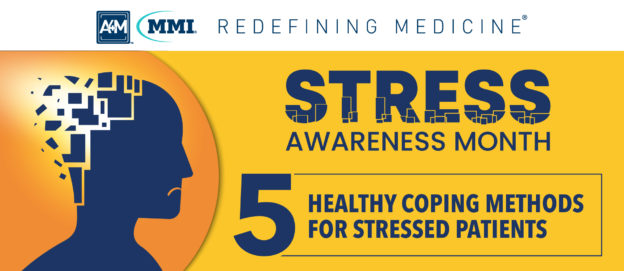April marks the beginning of Stress Awareness Month. This national observance aims to raise public awareness of the far-reaching, systemic consequences of chronic stress on physical and mental health.
While stress is a natural part of life, chronic stress and severe stress levels can have significant adverse effects when not managed effectively. In individuals with pre-existing genetic vulnerabilities to mental illness, high stress levels can actually trigger mental illness. Severe stress can greatly worsen symptoms for those who already have mental illness, especially when combined with common unhealthy coping strategies such as substance abuse, social withdrawal, and overworking.
Learning and implementing healthful coping skills is essential for supporting patients’ whole-body health. To successfully help manage stress year-round, it is essential to educate patients about wellness-focused coping methods that not only mitigate stress levels but also promote improved health.
Healthy Tips To Help Patients Cope With Stress
1. Encourage Regular Physical Activity
As one of the most effective stress management techniques, exercise and regular physical activity help the mind and body release tension. Any form of physical activity can relieve stress, including low-impact exercises such as brisk walking and dance. Exercising releases endorphins that enhance mood and boost energy levels; there is also the added benefit of relieving built-up anxiety by burning off excess adrenaline and cortisol through physical activity.
Research reports that 30% of adults feel less stressed after exercising, highlighting the vital role of movement in healthful coping. Up to 62% of adults who exercise or walk to help manage stress report that the technique is very or extremely effective. Although, at the same time, 43% of those participants reported skipping exercise due to stress in the past month. By emphasizing the whole-body benefits of physical activity, healthcare providers can help patients implement and maintain an exercise routine tailored to their individual needs and preferences.
2. Emphasize the Need for Rest
An increasing number of studies suggest that rest and sleep are key factors in managing stress, and failing to get enough of either could harm patients. Sleep is critical to healthy, effective coping and restoring the body and mind after stressful events. At the same time, sleep deprivation is one of the most common physical signs of high stress. According to one survey, over 40% of Americans report stress has prevented them from sleeping, and similar research has shown an association between chronic insomnia and higher levels of stress hormones as well as cortisol reactivity over time.
Clinicians should encourage their patients to take brief rest periods during the day, vacations away from home and work, and prioritize getting a good night’s sleep – all of which will help manage stress levels and improve health outcomes overall.
3. Highlight the Importance of a Strong Support Network
Often overlooked but incredibly powerful as a stress management tool is the presence of a trusted network of friends, family, and healthcare providers. According to the American Psychological Association, a solid support network can significantly improve our ability to cope with stress. Results from a 2015 survey indicate that 43% of participants who did not receive emotional support experienced increases in overall stress, compared with only 26% of those who had a robust support system. Clinicians can recommend staying in close touch with family and friends, seeking out opportunities for social connection, and reaching for support from psychological professionals as essential methods for dealing with stress.
4. Prescribe Mindfulness to Patients to Reduce Stress and Optimize Health – Mindfulness practices reduce activity in the part of the brain called the amygdala, which is central to switching on the stress response. When activity in the amygdala is reduced, so is the background level of stress. Even the Mayo clinic is now prescribing 15 minutes of mindfulness a day because it increases patience, promotes creative thinking, and manages symptoms of cancer, chronic pain, heart disease, high blood pressure, sleep problems, and tension headaches. It was found that meditation also decreases cortisol, the stress hormone, and can prevent many of the diseases listed above, which can be caused by stress. To easily recommend mindfulness to patients, clinicians can use ADigital Health’s 21 Days of Mindfulness digital care plan available on the platform. The 21 Days of Mindfulness plan includes 21 days of mindfulness practices, daily meditations, and a workbook.
5. Recommend Stress-Reducing Dietary Supplements, such as Ashwagandha and L-Theanine – With the economic crisis and global conflict currently upon us, it is not surprising that patients are likely at peak stress levels. Seventy-three percent of respondents to this year’s Stress in America survey reported feeling overwhelmed. It is something healthcare professionals can help with. There are many strategies currently available to help patients manage their stress levels, and one is dietary supplements. While a pill will not completely fix stress levels, certain supplements can help with symptoms. A4M’s remote patient care platform integrates Fullscript and Wellevate to help practitioners easily make supplement recommendations, such as Ashwagandha and L-Theanine, to patients right inside the ADigital Health account.

